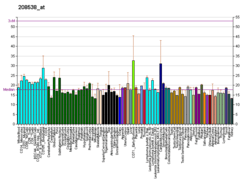ANP32C
Acidic leucine-rich nuclear phosphoprotein 32 family member C is a protein that in humans is encoded by the ANP32C gene.[2][3][4]
Function
Phosphoprotein 32 (PP32) is a tumor suppressor that can inhibit several types of cancers, including prostate and breast cancers. The protein encoded by this gene is one of at least two proteins that are similar in amino acid sequence to PP32 and are part of the same acidic nuclear phosphoprotein gene family. However, unlike PP32, the encoded protein is tumorigenic. The tumor suppressor function of PP32 has been localized to a 25 amino acid region that is divergent between PP32 and the protein encoded by this gene. This gene does not contain introns.[4]
See also
References
Further reading
- Matilla A, Radrizzani M (2005). "The Anp32 family of proteins containing leucine-rich repeats". Cerebellum. 4 (1): 7–18. PMID 15895553. doi:10.1080/14734220410019020.
- Kochevar GJ, Brody JR, Kadkol SS, Murphy KM, Pasternack GR (June 2004). "Identification of a functional mutation in pp32r1 (ANP32C)". Human Mutation. 23 (6): 546–51. PMID 15146458. doi:10.1002/humu.20030.
- Fan Z, Beresford PJ, Zhang D, Xu Z, Novina CD, Yoshida A, Pommier Y, Lieberman J (February 2003). "Cleaving the oxidative repair protein Ape1 enhances cell death mediated by granzyme A". Nature Immunology. 4 (2): 145–53. PMID 12524539. doi:10.1038/ni885.
- Kadkol SS, El Naga GA, Brody JR, Bai J, Gusev Y, Dooley WC, Pasternack GR (July 2001). "Expression of pp32 gene family members in breast cancer". Breast Cancer Research and Treatment. 68 (1): 65–73. PMID 11678310. doi:10.1023/A:1017919507109.
- Bai J, Brody JR, Kadkol SS, Pasternack GR (April 2001). "Tumor suppression and potentiation by manipulation of pp32 expression". Oncogene. 20 (17): 2153–60. PMID 11360199. doi:10.1038/sj.onc.1204294.
- Kadkol SS, Brody JR, Pevsner J, Bai J, Pasternack GR (September 1999). "Correction to "Modulation of oncogenic potential by alternative gene use in human prostate cancer"". Nature Medicine. 5 (9): 1087. PMID 10471270. doi:10.1038/12530.
